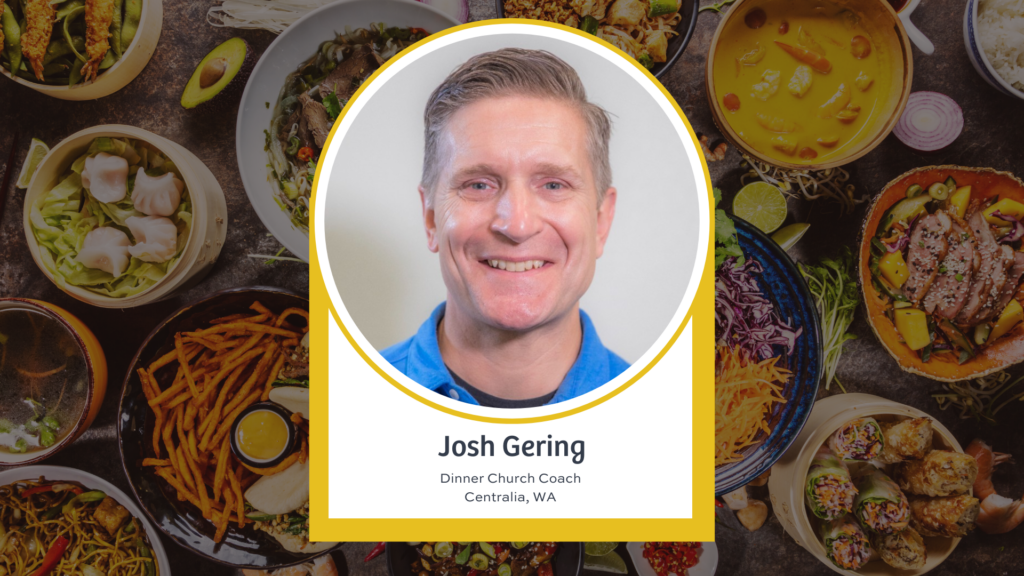Listen
Watch
Show Notes
What if your church is thriving, but not in the way you want it to? In this discussion, you’ll hear from Josh Gering, who oversees five dinner churches in a County that is exactly between Seattle, WA and Portland, OR. Josh’s church was doing great, but they wanted to reach more people outside of the reach of their church.
This interview highlights the unique ways Dinner Churches can work alongside existing congregations to do what they cannot.
Josh Gering is a pastor at Bethel Church in Centralia, WA. He has helped plant 5 dinner churches and also leads the Northwest Ministry Network Dinner Church planting initiative by coaching, training, and resourcing dinner church leaders throughout the Northwest. He is a graduate of the Dinner Church School of Leadership and has a Masters degree from Kairos University in Christian Leadership.
Help us spread the word about the Dinner Church podcast by subscribing and leaving us reviews on Apple Podcasts, Spotify, YouTube or wherever you enjoy your podcasts.

Related Resources:
Email us: podcasts@freshexpressions.com
Interview Summary
In this episode of the Dinner Church podcast, we delve into an insightful conversation with Josh Gering, a pioneering leader in the Dinner Church movement. His approach to church planting and community engagement provides a fresh perspective on spiritual outreach.
Josh Gering serves as an initiative leader in Centralia, Washington, significantly impacting the entire state and beyond. His journey in ministry spans several roles, from youth pastor to leading a campus, demonstrating his versatile leadership and deep commitment to his community. Josh’s story is a testament to the power of innovative ministry models like Dinner Churches to reach underserved communities.
In our conversation with Gering, several key themes emerged about the innovative Dinner Church model.
Community Building Through Shared Meals
The Dinner Church model uniquely integrates communal meals with worship, fostering a welcoming and inclusive atmosphere. Josh Gering emphasizes the transformative power of this setup, stating,
One of the most powerful things we get to do is bring people into the family of God… it’s about bringing them into the family of Jesus.
This approach not only nourishes the body but also builds a bridge to spiritual nourishment, creating deep, lasting bonds among participants.
The Vital Role of Music
Music is a critical component of Dinner Churches, enhancing the overall worship experience and making the space more inviting. Josh notes the effectiveness of live performances: “Live music is ten times better… It just brings a more personable element to the dinner.” This element of personal touch through music resonates with attendees, reinforcing the sense of community and belonging essential to the Dinner Church experience.
Expansion and Sustainability
Josh discusses the strategic replication and sustainability of the Dinner Church model, highlighting the importance of foresight and continuous training. He describes the planning involved:
When we started our first dinner church, we started knowing that in about nine months we’d be starting our second.
This proactive approach ensures the scalability of the model while maintaining its core values and effectiveness.
Challenges and Adaptive Strategies
Adapting to meet community needs and overcoming operational challenges are crucial for sustaining the Dinner Church model. Josh shares insightful strategies, reflecting on the need for flexibility and ongoing education:
If we’re going to reach people we weren’t reaching, we had to do something that we weren’t doing.
His commitment to continuous improvement and community engagement is pivotal in navigating the complexities of ministry work and community service.
Josh Gering’s work with Dinner Churches exemplifies a dynamic and inclusive approach to ministry. His story encourages us to think creatively about how we engage with our communities and the potential to transform lives through shared experiences and faith.
Reflection Questions
- How can faith communities balance tradition with innovation to remain relevant and impactful?
- In what ways can incorporating elements like live music transform the atmosphere of a community gathering?
- What role does consistent training play in sustaining a ministry model like Dinner Churches?
- What does Josh’s approach teach us about leadership in ministry?
- How can you apply the lessons from Dinner Churches to other forms of community outreach?
- What does it mean to let “the gospel use me,” as Josh describes?


